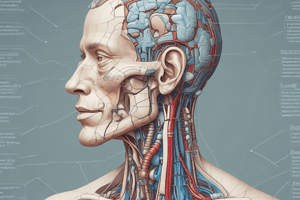Podcast
Questions and Answers
What does the prefix 'dys-' mean, and provide an example?
What does the prefix 'dys-' mean, and provide an example?
'Dys-' means painful or difficult; an example is dysmenorrhea, which refers to painful menstruation.
Explain the meaning of 'tachy-' and give an example of its use in a medical term.
Explain the meaning of 'tachy-' and give an example of its use in a medical term.
'Tachy-' means rapid; an example is tachycardia, which refers to a rapid heart rate.
Define the suffix '-oma' and provide a specific example of its use.
Define the suffix '-oma' and provide a specific example of its use.
The suffix '-oma' refers to a tumor; for example, lymphoma is a tumor of the lymphatic system.
What is the significance of the prefix 'hemi-' in medical terminology, and can you give an example?
What is the significance of the prefix 'hemi-' in medical terminology, and can you give an example?
What does the prefix 'anti-' imply, and how is it used in a medical context?
What does the prefix 'anti-' imply, and how is it used in a medical context?
What does the term 'cirrhosis' indicate about the liver's condition, based on its prefix?
What does the term 'cirrhosis' indicate about the liver's condition, based on its prefix?
Identify the prefix that means 'small' and provide a related medical example.
Identify the prefix that means 'small' and provide a related medical example.
Describe the term 'cyanosis' and explain what the prefix 'cyano-' signifies.
Describe the term 'cyanosis' and explain what the prefix 'cyano-' signifies.
Flashcards are hidden until you start studying
Study Notes
Anatomy Terminology
- Cardio: Relates to the heart.
- Cutaneous: Pertains to the skin.
- Gastric: Associated with the stomach.
- Hepa: Refers to the liver.
- Pulmonary: Connected to the lungs.
- Renal: Pertains to the kidneys.
- Thorax: Chest area, contains heart and lungs, upper abdomen enclosed by ribs.
- Neuro: Relates to nerves.
- Hema: Refers to blood.
- Chole: Associated with bile or gallbladder.
- Nuchal: Pertains to the nape of the neck.
Prefixes in Medical Terminology
- Anti-: Means against; e.g., antibiotic fights bacteria.
- Bi-: Indicates two; e.g., bilateral affects both sides.
- Brady-: Signifies slow; e.g., bradycardia is a slow heart rate.
- Cirrh-: Refers to yellow; e.g., cirrhosis leads to yellowing of skin.
- Contra-: Means against or opposite; e.g., contraceptive prevents pregnancy.
- Crypt-: Indicates hidden or concealed; e.g., cryptorchidism is undescended testes.
- Cyano-: Means blue; e.g., cyanosis is bluish discoloration of skin.
- Dys-: Indicates painful or difficult; e.g., dysmenorrhea is painful menstruation.
- Ecto-: Means outside; e.g., ectoderm is the outer layer of an embryo.
- Hemi-: Means half; e.g., hemiplegia is paralysis of one side of the body.
- Hyper-: Indicates excessive; e.g., hypertension is high blood pressure.
- Hypo-: Means under or deficient; e.g., hypotension is low blood pressure.
- Macro-: Signifies large; e.g., macromastia refers to abnormally large breasts.
- Micro-: Indicates small; e.g., microsomia refers to abnormally small body.
- Neo-: Means new; e.g., neonate refers to a newborn.
- Oligo-: Signifies few; e.g., oligomenorrhea is infrequent menstruation.
- Tachy-: Means rapid; e.g., tachycardia is a rapid heart rate.
Suffixes in Medical Terminology
- -centesis: Refers to puncture for drainage; e.g., paracentesis removes fluid.
- -ectomy: Signifies excision or removal; e.g., appendectomy removes the appendix.
- -itis: Indicates inflammation; e.g., appendicitis is inflammation of the appendix.
- -megaly: Means enlarged; e.g., cardiomegaly is an enlarged heart.
- -oma: Refers to tumor; e.g., myoma is a benign muscle tumor.
- -ostomy: Means creating an opening; e.g., colostomy creates an opening in the colon.
Studying That Suits You
Use AI to generate personalized quizzes and flashcards to suit your learning preferences.




